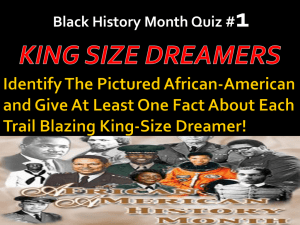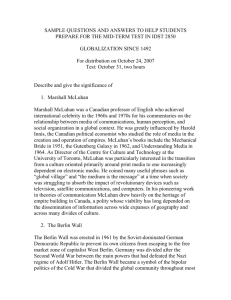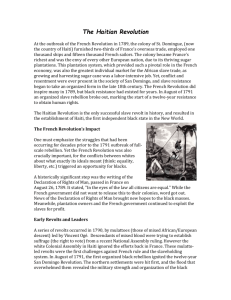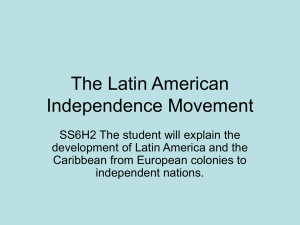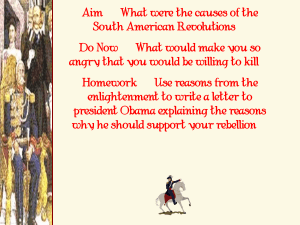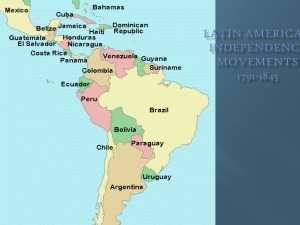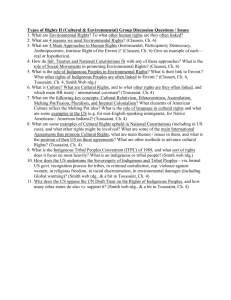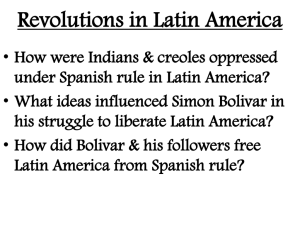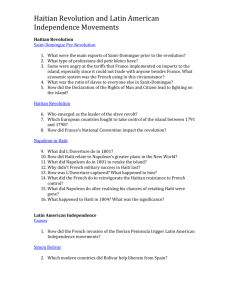World History Unit 02 2013
advertisement
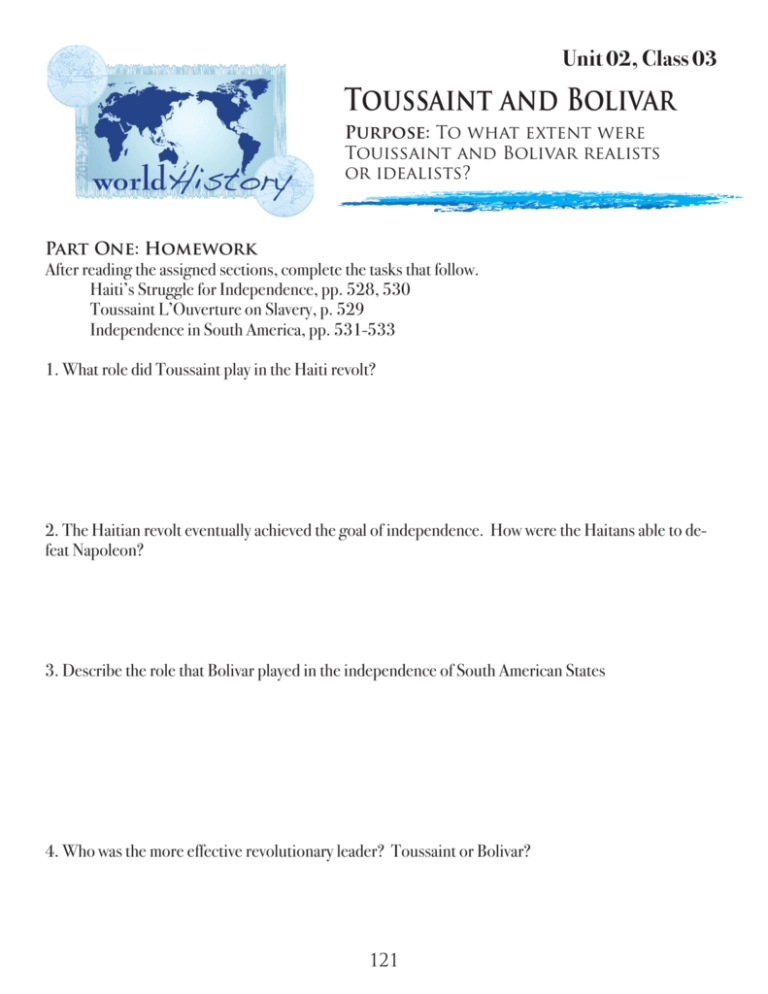
Unit 02, Class 03 2013-2014 Toussaint and Bolivar worldHistory Purpose: To what extent were Touissaint and Bolivar realists or idealists? Part One: Homework After reading the assigned sections, complete the tasks that follow. Haiti’s Struggle for Independence, pp. 528, 530 Toussaint L’Ouverture on Slavery, p. 529 Independence in South America, pp. 531-533 1. What role did Toussaint play in the Haiti revolt? 2. The Haitian revolt eventually achieved the goal of independence. How were the Haitans able to defeat Napoleon? 3. Describe the role that Bolivar played in the independence of South American States 4. Who was the more effective revolutionary leader? Toussaint or Bolivar? 121 Part Two: South American Geography in 1833 Identify the following: Argentina, Chile, Columbia, Peru, Bolivia, Ecuador, Venezuela, Uruguay, European Control 122 Part Three: Bolivar and Toussaint Section A: Biography Using your homework, write a summary paragraph for Bolivar and Toussaint. In this paragraph, give a review of Bolivar or Toussaint’s role in the independence movements. For each summary, add a newspaper style headline. headline headline 123 Section B: Toussaint Primary Source: A Constitution Read the excerpt of Toussaint’s Haitian constitution. What are the main ideas? Write a brief summary in the right column. (First) Haitian Consttution Title II On its inhabitants Art 3 — There can be no slaves on this territory; servitude has been forever abolished. All men are born, live and die there free and French. Art 4 — All men can work at all forms of employment, whatever their color. Art 5 — No other distinctions exist than those of virtues and talents, nor any other superiority than that granted by the law in the exercise of a public charge. The law is the same for all, whether it punishes or protects. Title III On religion Art 6 — The Catholic religion, Apostolic and Roman, is the only one publicly professed. Title V On men in society Art 12 — The Constitution guarantees individual freedom and safety. No one can be arrested except by virtue of a formally expressed order, issued by a functionary who the law gives the right to arrest and detain in a publicly designated place. Art 13 — Property is sacred and inviolable. Every person, either by himself or his representatives, has the free disposal and administration of that which is recognized as belonging to him. Whoever infringes upon this right renders himself criminal towards society and responsible as concerns the person troubled in his property. Title XIII General dispositions Art 63 — Every person’s home is an inviolable asylum. During the night, no one has the right to enter there except in case of fire, flood or appeal from within. During the day it can be entered for a specially determined objective, or by a law or an order emanating from a public authority. Art 64 — In order for an act ordering the arrest of a person to be executed it is necessary that it: Formally express the motive for the arrest and the law in execution of which it is ordered; Emanate from a functionary who the law had formally given the power to do so; The person arrested be given a copy of the order. Art 66 — All persons have the right to address individual petitions to any constituted authority, and especially to the governor. http://www.marxists.org/history/haiti/1801/constitution.htm 124 Section B: Toussaint Primary Source: A Constitution Read the excerpt of Bolivar’s Letter from Jamaica, September 6, 1815. What are the main ideas? Write a brief summary in the right column. Kingston, Jamaica, September 6, 1815 My dear Sir: With what a feeling of gratitude I read that passage in your letter in which you say to me: “I hope that the success which then followed Spanish arms may now turn in favor of their adversaries, the badly oppressed people of South America.” I take this hope as a prediction, if it is justice that determines man’s contests. Success will crown our efforts, because the destiny of America has been irrevocably decided; the tie that bound her to Spain has been severed. Only a concept maintained that tie and kept the parts of that immense monarchy together. That which formerly bound them now divides them. The role of the inhabitants of the American hemisphere has for centuries been purely passive. Politically they were nonexistent. We are still in a position lower than slavery, and therefore it is more difficult for us to rise to the enjoyment of freedom...States are slaves because of either the nature or the misuse of their constitutions; a people is therefore enslaved when the government, by its nature or its vices, infringes on and usurps the rights of the citizen or subject. Applying these principles, we find that America was denied not only its freedom but even an active and effective tyranny. Let me explain. Under absolutism there are no recognized limits to the exercise of governmental powers. ...To them is entrusted the administration of civil, military, political, religious, and tax matters. It is harder, Montesquieu has written, to release a nation from servitude than to enslave a free nation. This truth is proven by the annals of all times, which reveal that most free nations have been put under the yoke, but very few enslaved nations have recovered their liberty. Despite the convictions of history, South Americans have made efforts to obtain liberal, even perfect, institutions, doubtless out of that instinct to aspire to the greatest possible happiness, which, common to all men, is bound to follow in civil societies founded on the principles of justice, liberty, and equality. But are we capable of maintaining in proper balance the difficult charge of a republic? Is it conceivable that a newly emancipated people can soar to the heights of liberty, and, unlike Icarus, neither have its wings melt nor fall into an abyss? Then will we march majestically toward that great prosperity for which South America is destined. I am, Sir, etc., etc. SIMON BOLIVAR http://excerpts.indepthinfo.com/simon-bolivars-jamaica-letter 125 Section C: Comparison What are the similarities in the primary sources from Toussaint and Bolivar? Part Four: Recap Purpose: Did the revolutions of Mexico and the United Provinces establish the ideas of liberty, equality and fraternity? Purpose: To what extent were Toussaint and Bolivar realists or idealists? 126
